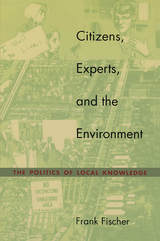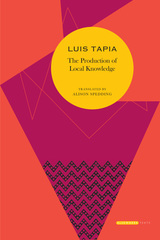3 books about Local Knowledge

Challenging Nature
Local Knowledge, Agroscience, and Food Security in Tanga Region, Tanzania
Philip W. Porter
University of Chicago Press, 2005
Tanga Region, Tanzania, is an area of persistent rural poverty with a long history of drought, floods, food shortages, famine, and social and economic disruption. Though farmers have been cultivating the land there for hundreds of years, they have consistently been unable to supply adequate food for the region's inhabitants. In Challenging Nature, Philip Porter examines eighteen farming communities to understand what the farmers there know about their environment and which historical and economic factors play into the lack of food security.
Porter first began work on this project in 1972, asking 250 farmers in the region about life history, environmental and agricultural changes, types of crops grown and methods of planting, environmental assessments, agricultural practices, food and water supplies, training and education, and attitudes toward nature. Twenty years later, he returned and reinterviewed as many farmers as could be found from the first survey. The result contextualizes the environmental history of the region while informing current and future agricultural development.
Porter first began work on this project in 1972, asking 250 farmers in the region about life history, environmental and agricultural changes, types of crops grown and methods of planting, environmental assessments, agricultural practices, food and water supplies, training and education, and attitudes toward nature. Twenty years later, he returned and reinterviewed as many farmers as could be found from the first survey. The result contextualizes the environmental history of the region while informing current and future agricultural development.
[more]

Citizens, Experts, and the Environment
The Politics of Local Knowledge
Frank Fischer
Duke University Press, 2000
The tension between professional expertise and democratic governance has become increasingly significant in Western politics. Environmental politics in particular is a hotbed for citizens who actively challenge the imposition of expert theories that ignore forms of local knowledge that can help to relate technical facts to social values.
Where information ideologues see the modern increase in information as capable of making everyone smarter, others see the emergence of a society divided between those with and those without knowledge. Suggesting realistic strategies to bridge this divide, Fischer calls for meaningful nonexpert involvement in policymaking and shows how the deliberations of ordinary citizens can help solve complex social and environmental problems by contributing local contextual knowledge to the professionals’ expertise. While incorporating theoretical critiques of positivism and methodology, he also offers hard evidence to demonstrate that the ordinary citizen is capable of a great deal more participation than is generally recognized. Popular epidemiology in the United States, the Danish consensus conference, and participatory resource mapping in India serve as examples of the type of inquiry he proposes, showing how the local knowledge of citizens is invaluable to policy formation. In his conclusion Fischer examines the implications of the approach for participatory democracy and the democratization of contemporary deliberative structures.
This study will interest political scientists, public policy practitioners, sociologists, scientists, environmentalists, political activists, urban planners, and public administrators along with those interested in understanding the relationship between democracy and science in a modern technological society.
Where information ideologues see the modern increase in information as capable of making everyone smarter, others see the emergence of a society divided between those with and those without knowledge. Suggesting realistic strategies to bridge this divide, Fischer calls for meaningful nonexpert involvement in policymaking and shows how the deliberations of ordinary citizens can help solve complex social and environmental problems by contributing local contextual knowledge to the professionals’ expertise. While incorporating theoretical critiques of positivism and methodology, he also offers hard evidence to demonstrate that the ordinary citizen is capable of a great deal more participation than is generally recognized. Popular epidemiology in the United States, the Danish consensus conference, and participatory resource mapping in India serve as examples of the type of inquiry he proposes, showing how the local knowledge of citizens is invaluable to policy formation. In his conclusion Fischer examines the implications of the approach for participatory democracy and the democratization of contemporary deliberative structures.
This study will interest political scientists, public policy practitioners, sociologists, scientists, environmentalists, political activists, urban planners, and public administrators along with those interested in understanding the relationship between democracy and science in a modern technological society.
[more]

The Production of Local Knowledge
History and Politics in the Work of René Zavaleta Mercado
Luis Tapia Mealla
Seagull Books, 2016
This volume presents a comprehensive examination of the work of René Zavaleta Mercado (1939–1984), the most notable Bolivian political thinker of the twentieth century. While Zavaleta did not live to see the triumph of the indigenous social movements that have made Bolivia famous in recent years, his writings influenced many of the activists and ideologues who made today’s changes possible. This exploration of Zavaleta’s work by Luis Tapia, a contemporary political analyst who has been a colleague of many of the central actors in today’s government, presents a detailed panorama of Bolivian history that establishes the context of Zavaleta’s analysis of the events of his time, from the revolutionary nationalist movement which took power in 1952 through the military dictatorships that followed it from 1964 onwards to the popular protests that eventually defeated the dictatorship and restored democratic government in 1982. The book will be necessary reading for anyone who wants to understand the decades of history and the ideological currents that laid the groundwork for the rise to power of the neo-indigenists lead by Evo Morales in the twenty-first century.
[more]
READERS
Browse our collection.
PUBLISHERS
See BiblioVault's publisher services.
STUDENT SERVICES
Files for college accessibility offices.
UChicago Accessibility Resources
home | accessibility | search | about | contact us
BiblioVault ® 2001 - 2024
The University of Chicago Press









